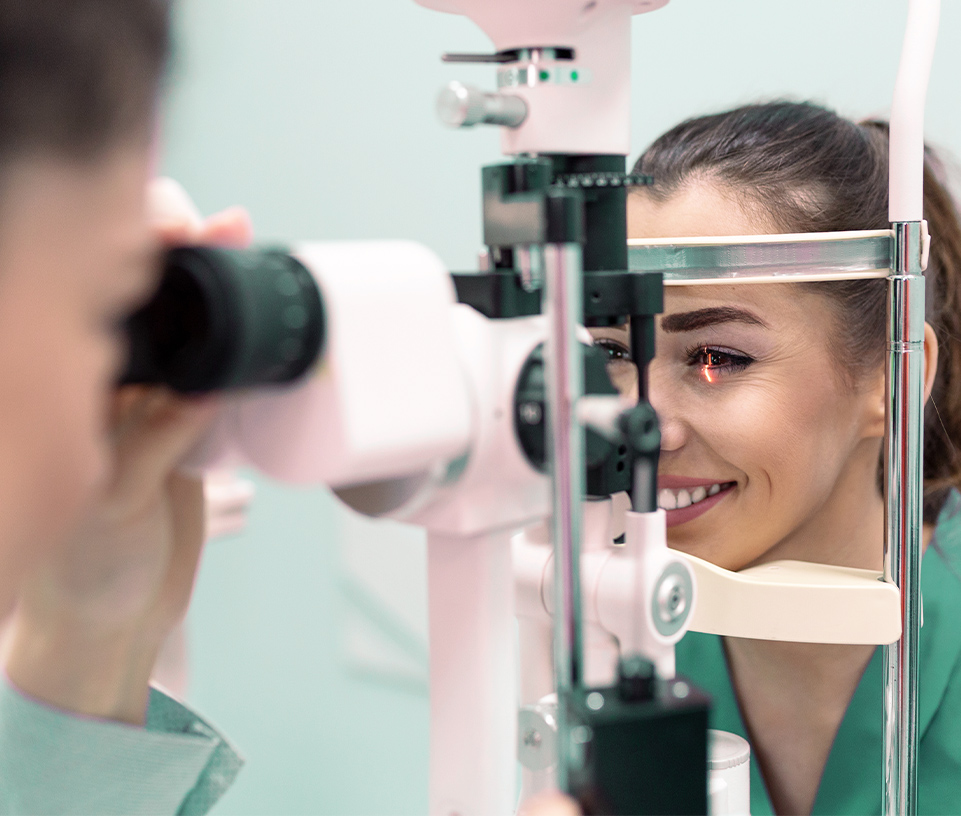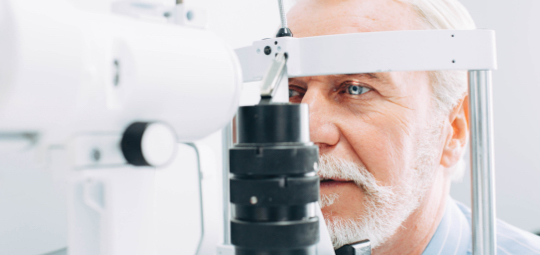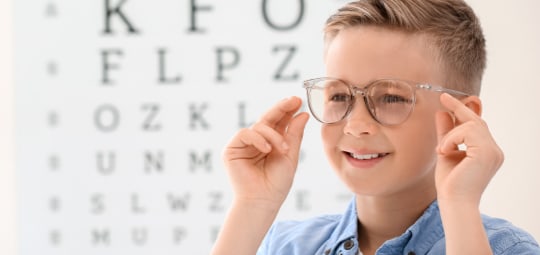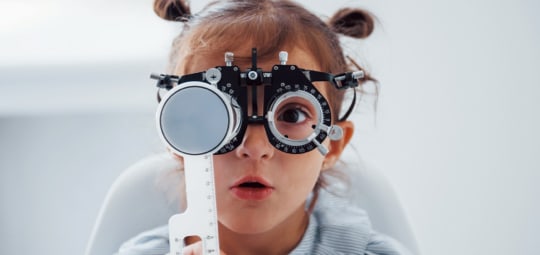
Experienced Eye Disease Care
At The Village Eye Care, our experienced team is here to help diagnose and manage eye disease. We use our diagnostic technology to explore a number of vision care issues such as cataracts, glaucoma, conjunctivitis, and age-related macular degeneration.
Contact us to diagnose and manage your eye disease needs—our team is looking forward to meeting you!

Exploring Eye Diseases
Untreated eye disease can cause permanent vision loss and even blindness. Many eye diseases don’t show symptoms in their early stages, and by the time you notice that your vision is changing, you may have already suffered significant and irreversible vision loss. That makes early detection essential.
The only way to detect eye diseases in their early stages is by undergoing a comprehensive eye exam. Regular eye exams let your eye doctor identify and track subtle changes in your vision and eye health, making it possible for them to detect and treat eye diseases early on.
Avoid putting your vision at risk and book an appointment with our dedicated team today at The Village Eye Care.

Common Types of Eye Disease
Eye diseases can come in a variety of forms—our approach to diagnosis and management puts our patients first and keeps them informed.
Age-Related Macular Degeneration
According to the American Optometric Association, age-related macular degeneration (AMD) is the leading cause of severe vision loss in adults over the age of 50. By 2050 as many as 88 million Americans are projected to suffer from AMD.
AMD occurs when the macula, the part of your retina that is responsible for color perception and detailed vision, deteriorates over time. As this condition worsens, your central vision is affected and slowly lost.
Please visit the American Optometric Association’s website or contact us to speak with our experts for more information regarding AMD.
Conjunctivitis
Conjunctivitis, more commonly known as “pink eye,” is a condition that occurs when the thin, clear layer (the conjunctiva) that covers the white of your eyes becomes inflamed. The inflammation causes the blood vessels in your eyes to dilate, making our eyes red and bloodshot.
Conjunctivitis has 3 main forms:
- Viral conjunctivitis is caused by a virus and is extremely contagious. Symptoms include watery or itchy eyes and significant discharge. Similar to a viral cold, viral conjunctivitis does not typically require prescription treatment. However, you should refrain from going to work or school and practice good eye hygiene because it is contagious.
- Bacterial conjunctivitis is caused by a bacterial infection and requires a prescription for antibiotics from your eye doctor. Symptoms include yellow or green discharge. This condition is contagious, so you should stay away from others until your treatment is over and your symptoms clear up.
- Allergic conjunctivitis is triggered by allergens such as pollen, pet dander, and dust. Symptoms include stringy white discharge and watery, itchy eyes, and may be accompanied by a stuffy or runny nose. This condition is not contagious. Allergic conjunctivitis may be either seasonal (if triggered by pollen) or year-round (if triggered by pet dander or dust). Oral or ocular antihistamines may help ease symptoms.
If you suspect you have conjunctivitis, you should make an appointment to see our team as soon as possible. An appointment can help determine if your condition requires treatment or is contagious. You should also avoid wearing your contact lenses until your conjunctivitis has cleared.
Cataracts
Cataracts occur when the proteins in your natural lenses become opaque over time, clouding your vision. Cataracts occur naturally as part of the aging process.
Common symptoms of cataracts include:
- Hazy or blurry vision
- Fading of colors
- Increased sensitivity to glare from lights, particularly during nighttime driving
Almost everyone develops cataracts as they age, but factors such as UV exposure, smoking, and alcohol consumption can increase your chances of developing cataracts sooner than usual.
Depending on how severe your cataracts are, your eye doctor will recommend different courses of action. Minor cataracts can be worked around by using more light while reading or wearing eyeglasses with an anti-glare coating.
However, if your cataracts are significantly impacting your vision or preventing you from going about your daily routine, you may benefit from cataract surgery. Cataract surgery involves removing and replacing your cloudy lens with an artificial intraocular lens (IOL) and can significantly improve your vision.
Glaucoma
Glaucoma is the loss of peripheral vision resulting from damage to the optic nerve. The optic nerve is responsible for relaying visual information from our eyes to our brain. Though most cases of glaucoma occur when the pressure inside our eye is too high, it can also occur even when our eye pressure is normal.
Glaucoma does not typically have any symptoms in its early stages, making it a particularly dangerous eye disease. By the time you begin to notice vision problems, you may have already experienced irreversible vision loss.
Glaucoma is the second leading cause of blindness in the United States.
Glaucoma is preventable and treatable, but only if it is detected early during a comprehensive eye exam. That is why all comprehensive eye exams at The Village Eye Care include glaucoma testing.

Being Cautious with Eye Diseases
Most eye diseases are preventable, but early detection is essential. Our team is experienced with eye disease diagnosis and management.
When was the last time you had a comprehensive eye exam to check for eye disease? Don’t wait and contact us to book an appointment today!

Our Brands





Our Location
The Village Eye Care is conveniently located in Surprise, Arizona.

Our Address
- 15003 W Bell Rd, Ste 100
- Surprise, AZ 85374
Contact Us
- Phone: 623-931-2943
- Fax: 623-583-2253
Our Hours
- Monday: 8:00 AM – 5:00 PM
- Tuesday: 8:00 AM – 5:00 PM
- Wednesday : 8:00 AM – 5:00 PM
- Thursday : 8:00 AM – 5:00 PM
- Friday : 8:00 AM – 3:00 PM
- Saturday: Closed
- Sunday: Closed







